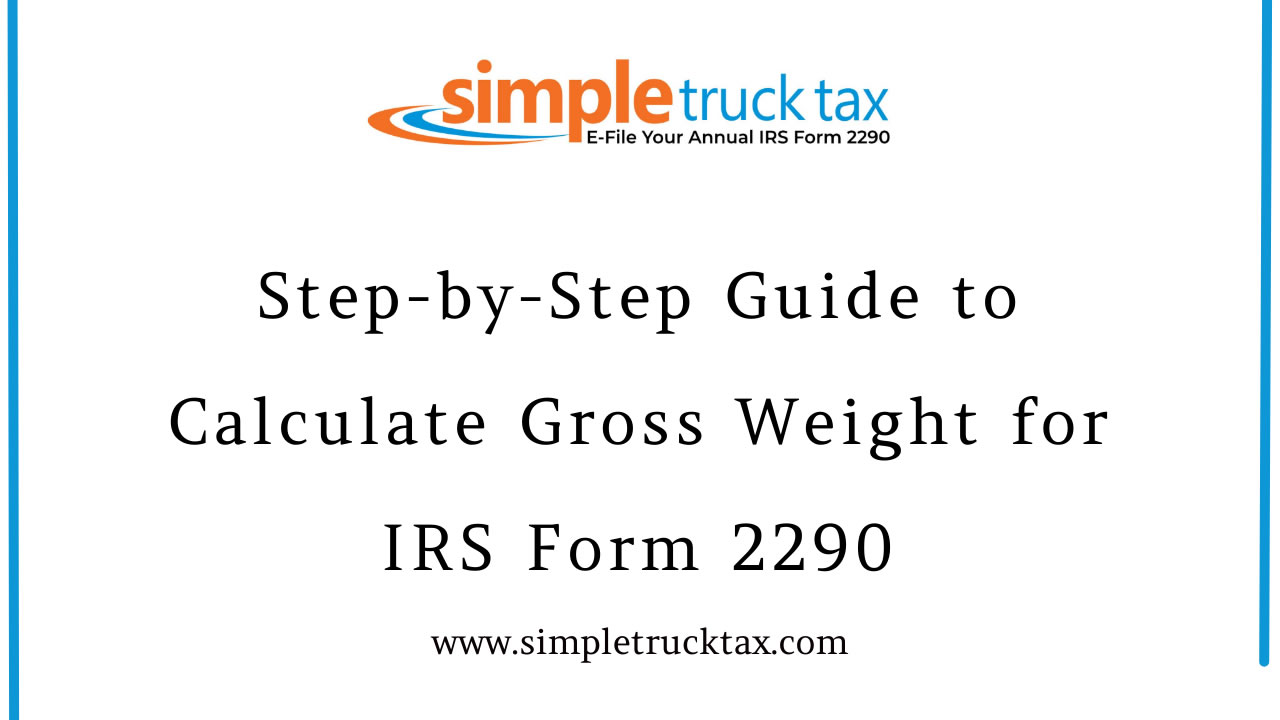
Understanding the Taxable Gross Weight and How to Calculate It on IRS Form 2290
For the owner of a heavy vehicle, it is very important to get the correct gross weight taxable for the IRS Form 2290, to avoid administrative problems and penalties. It's the gross weight taxable that determines how your vehicle is taxed under the IRS regulations.
Actually, the first thing you need to be sure of is that you have your weight calculations accurate, and you already have them when you file — if you're a regular filer, accurate weight calculations are necessary for you too.
What Does Taxable Gross Weight Mean?
Taxable gross weight is the result of adding:
The weight of the vehicle as it is not loaded for use AND
The weight of all trailers usually used with it AND
The weight of the maximum load usually carried.
IRS allows vehicles to be included in 22 weight categories, starting with 55,000 pounds (Category A) and over 75,000 pounds (Category V). Each category is associated with a specific tax rate.
Moreover, vehicles in Category W are reserved for those that are suspended vehicles — those which are not used for more than 5,000 miles per year (or 7,500 miles for agricultural use). If they maintain and submit proper mileage records, they may benefit from a tax suspension.
What Method Would You Use To Calculate Taxable Gross Weight
Next, we share with you a few methods that are normally used to get to the taxable weight of your vehicle:
The manufacturer’s manual or the nameplate You can easily find the unloaded vehicle weight and the load capacity by checking the manufacturer's manual or the nameplate.
(a) Certified—Use the services provided by CAT Scale for measurements that are accurate and acceptable to the Internal Revenue Service (IRS) and
(b) Documentation-You need to have documents that function as proof of verification of the weight details from the weighing station.
State Registration Documents
Check your DMV registration papers carefully to make sure that the determined gross vehicle weight category is accurate.
Why Accuracy Is Essential
Mistakenly stating the weight can cause a person:
Miscalculating tax,
Payment that is off the mark,
IRS penalties or getting the attention of the auditors.
Whenever your truck's weight increases or changes during the tax year, then you need to report it on the new schedule 2290 and pay the adjusted weight-based tax amount which is half the originally paid amount.
Exemptions and Special Cases
There are some driving purposes, such as those for agricultural or seasonal work, when the vehicle can be driven without a permit, provided it remains within the allowed mileage limits. The following will serve as evidence:
Keep and correctly fill out mileage logs,
Measure the weight of goods you are transporting,
Hold the necessary records of the vehicle's operations.
Documentation and Compliance
Keep a paper trail of all necessary records without fail for at least three years, and this encompasses but is not limited to the following:
Scales tickets,
Load permits,
Manufacturer specs,
Registration documents.
These particular-planned data mainly serve as proof in case of an audit by IRS.
The precise calculation of the taxable gross vehicle weight is the most essential part of preparing Form 2290 for IRS correctly, timely reviewing of the vehicle weight particularly for any changes or upgrades made to the vehicle signifies compliance and prevents IRS headaches.
The process could be made faster and easier by e-filing with the IRS approved e-file provider and keeping records that support the filed tax returns.